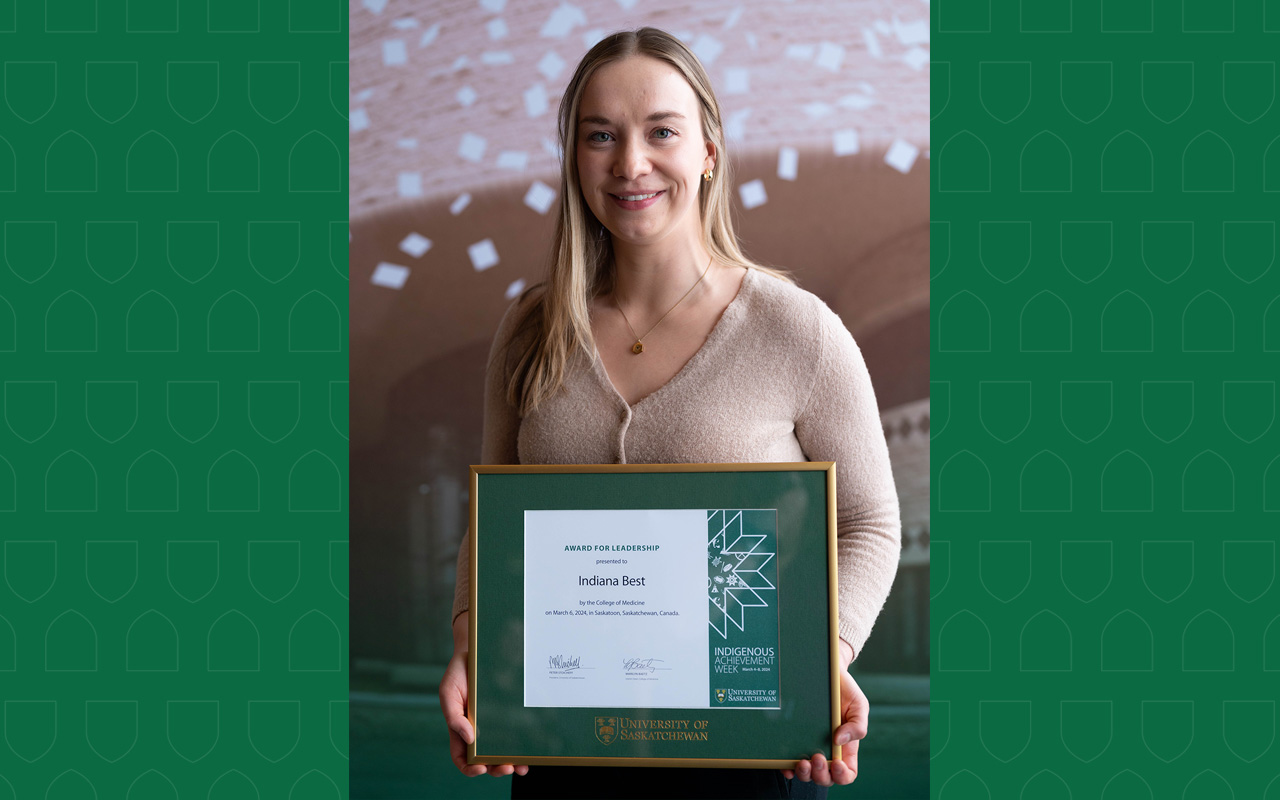
USask medical student recognized with leadership award
Indiana Best's dedication to leading and advocating for her peers and community earned her recognition at the Indigenous Student Achievement Awards in March.
By AMANDA WORONIUKBest is a second-year Métis medical student in the University of Saskatchewan's College of Medicine. She was chosen for the Leadership Award by her Indigenous peers in the college. The event is part of the university’s Indigenous Achievement Week, which celebrates Métis, First Nations and Inuit students, staff, faculty and alumni’s successes and contributions.
Best is actively involved in leadership and advocacy roles across the college and in Saskatoon, including serving on the Student Medical Society of Saskatchewan and participating in the college’s Indigenous Working Group. She is also a former board member for the Student Wellness Initiative Towards Community Health (SWITCH) clinic in Saskatoon.
Prior to enrolling in the College of Medicine, Best completed a master's degree in public health at USask, where she conducted research with the Métis community. Best also delivered an inspiring talk, titled "Journey of a seed: Academic and personal learnings through a Métis lens" at the TEDxUniversityofSaskatchewan event in January 2024.
We asked Best a few questions about her studies at the college and what inspires her.
Why did you decide to pursue a career as a physician?
Following my bachelor's degree in biomedical health science, I realized that lab-based research didn't resonate with my interest in public health. This led me to pursue a Master of Public Health, which helped enhance my understanding of policy and population health, yet it lacked the direct public interaction I was seeking. Thus, I transitioned into medicine, which offers me the ideal combination of scientific inquiry, research and connection to community.
You received the award for leadership. Could you share about one person you think is a good leader and what qualities you believe make them effective?
There are so many amazing Indigenous leaders I look up to! An incredible leader who I have known and looked up to for years is Dr. Veronica McKinney. What makes Dr. McKinney such an incredible leader is her empathy, kindness and connection to community and culture. She leads in a way that inspires others, motivating them to see their potential and focusing on the needs of the community.
You are the vice-president (VP), advocacy for the SMSS and are actively involved in the college’s Indigenous admissions process and the Indigenous Working Group. What motivated you to become interested in taking on these roles?
I started my involvement with the Indigenous Working Group while I was in my master’s program and was motivated to get involved to increase the representation of Indigenous students, and particularly Métis students, in medicine. I am incredibly proud of the work of the Admissions Committee with the recent changes to the Indigenous application process that now focuses on the many aspects Indigenous applicants bring to medical school.
I chose to pursue the role of SMSS VP, advocacy so that I could strengthen my leadership skills through advocacy work, particularly working to support community-level initiatives. To me, advocacy is meaningful when it fulfills the needs of the community/population of interest.
You have participated at the national level with mentorship and have established local mentorship opportunities for Indigenous youth. Why do you feel mentorship is important?
Mentorship is crucial for Indigenous youth as it provides guidance and support from individuals who have walked similar paths and understand the unique challenges faced by Indigenous communities. Mentorship offers not only academic assistance but also cultural guidance, helping youth navigate their identities within the broader context of their community's traditions and values.
Mentorship can also foster a sense of belonging and community by connecting with mentors who share similar cultural backgrounds, Indigenous youth can feel seen, heard, and understood. This sense of belonging is essential for overall well-being and success, and not only benefits the individual mentee but strengthens the Indigenous community, celebrating our culture and providing opportunities for growth and learning.
What advice would you give to a first-year Indigenous student interested in going into medical school?
Find a mentor, someone who can help guide you through the process and provide support along the way. Every path can be a path to medical school, don’t be afraid to be different and stay true to yourself.
